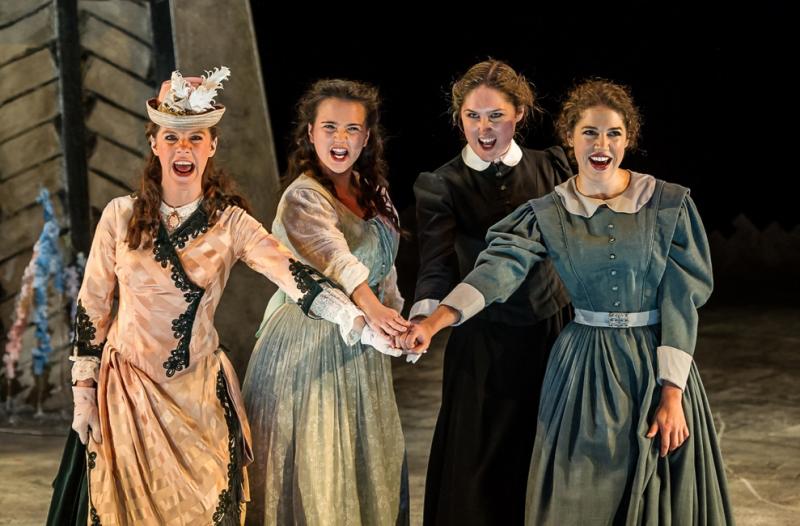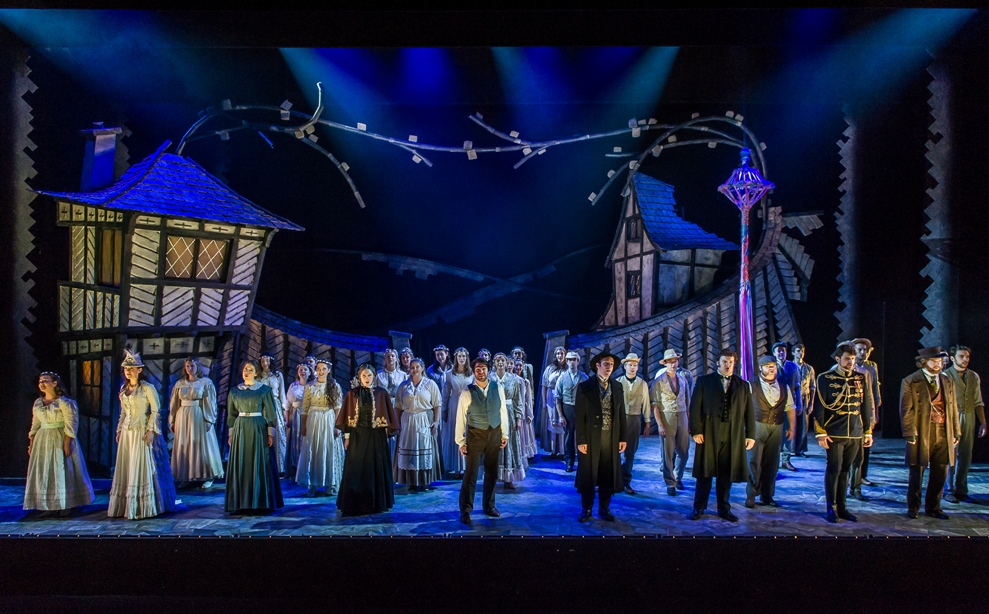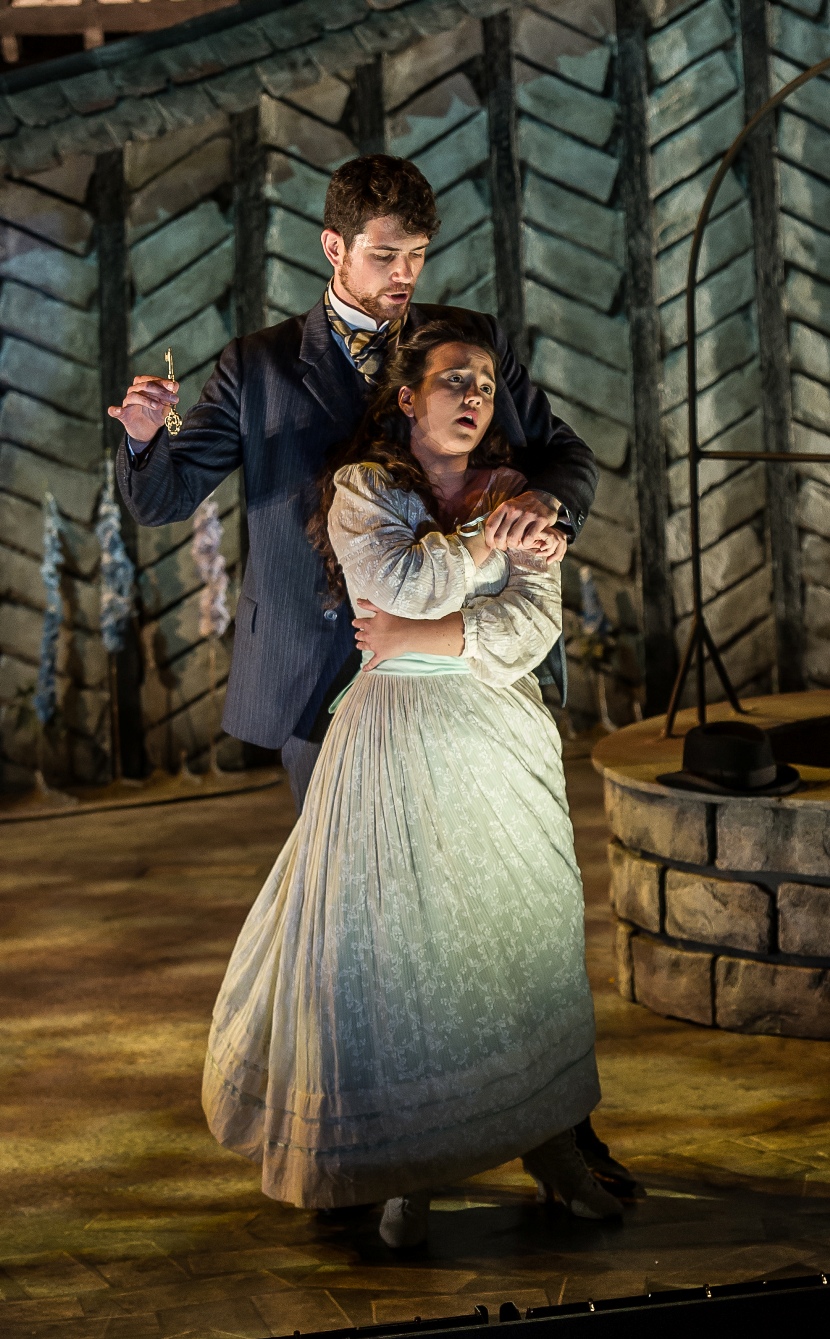The Cunning Peasant, Guildhall School | reviews, news & interviews
The Cunning Peasant, Guildhall School
The Cunning Peasant, Guildhall School
Students deliver Dvořák's folky songs and dances with appropriate youthful zest

Dvořák’s rustic operetta sits, swinging its legs rather diffidently, historically somewhere between the neverland Bohemia of Smetana’s The Bartered Bride and the lacerating reality of village life in Janáček'’s Jenůfa. The Cunning Peasant’s charms lie in its string of sophisticated songs and dances, more through-composed than Smetana’s, and in the abundance of not over-taxing roles, as well as chorus numbers, it offers to students.
That the Guildhall School embraces these so cheerfully has much to do with the way that fine, underrated conductor Dominic Wheeler effortlessly drives the tractor, slipping from one delicious metre into another, from polka to country waltz, with real panache. The ensemble May Day celebrations go with a rough edged swing; the choreography, by Richard Jones’s right-hand woman Sarah Fahie, makes it look spontaneous, with plenty of merry noises from the participants, but weaves beguiling patterns in the seeming mayhem.
Director Stephen Medcalf has a harder job maintaining interest in a non-plot over two hours, and sometimes over-eggs the lecherous pudding, not least when a randy Prince/Duke makes none too subtle gestures with a phallic delphinium, but he keeps it on the move. The names have been changed from Dvořák’s Czechia to Hardy’s Wessex – heroine Bétuška becomes Bathsheba, her father Martin, the not-so-cunning peasant, Gabriel, and so on – but they forgot to tell designer Francis O’Connor, whose skewed houses remain distinctly Mittel-European, or rather perhaps a country version of Wagner’s Nuremberg (ensemble scene pictured below).

What happens, then? Our pretty peasant girl is pursued by four men: one who wants to marry her but has no money, three others who need tripping up: a rich suitor she doesn’t want – characterized here as a local Jew, plausible in Bohemia but less so in Wessex – a philandering Duke and his comic valet. As the plot introduces the aristocracy and makes a nod to The Marriage of Figaro, Medcalf tries to make the Duke more of a shit than Dvořák's music paints him, and sees a threat in the all-too-happily restored status quo at the end, but the score can’t take it. The problem is that there’s none of the deeper shades which make a great comedy. Even Smetana injected pathos in The Bartered Bride’s great last-act quintet and soprano aria; Dvořák has sentiment but no depth, and nor do any of the characters.
 The girls do best. The second-cast Bathsheba, Laura Ruhi-Vidal, has effortless stage presence and glows by the time of the second-act duet – this sounds like a Strauss Sophie in the making – but her tenor love, the Joseph of Lawrence Thackeray, has only two modes, loud and falsetto; it’s a promising voice, but it needs a core. So, more seriously, does Martin Hässler's as the Duke (pictured right with Ruhi-Vidal): handsome on stage but lacking solid support, without which most notes were out of true last night. There’s work worth doing here, but it seems irresponsible of the Guildhall to give him a Schubert Winterreise before the public at this stage. No such caveats apply to his zesty “wife”, Alison Langer, Emma Kerr’s housekeeper or Anna Gillingham’s maid: with Ruhi-Vidal, they bring down the Act One curtain with a delightful “Merry Women of Wessex” quartet.
The girls do best. The second-cast Bathsheba, Laura Ruhi-Vidal, has effortless stage presence and glows by the time of the second-act duet – this sounds like a Strauss Sophie in the making – but her tenor love, the Joseph of Lawrence Thackeray, has only two modes, loud and falsetto; it’s a promising voice, but it needs a core. So, more seriously, does Martin Hässler's as the Duke (pictured right with Ruhi-Vidal): handsome on stage but lacking solid support, without which most notes were out of true last night. There’s work worth doing here, but it seems irresponsible of the Guildhall to give him a Schubert Winterreise before the public at this stage. No such caveats apply to his zesty “wife”, Alison Langer, Emma Kerr’s housekeeper or Anna Gillingham’s maid: with Ruhi-Vidal, they bring down the Act One curtain with a delightful “Merry Women of Wessex” quartet.
Two more tenors show promise, Robin Bailey as the suitor and John Findon, stepping in as valet John: less would be more in terms of the mugging, and the accent is no more successful than Langer's in a kind of Countess-impersonates-Susanna deception scene – since Ruhi-Vidal doesn’t adopt one in the first place, the point is lost – but some amazing sounds pop out at times. A bit more polish is needed from David Shipley’s harsh dad, too, though the raw material is certainly there. The ladies of the chorus sound superb, while not all the men know their words (nothing new there). There’s much simple pleasure to be had here, but next time let’s have a real Dvořák corker like the later Devil and Kate.
rating
Explore topics
Share this article
The future of Arts Journalism
You can stop theartsdesk.com closing!
We urgently need financing to survive. Our fundraising drive has thus far raised £49,000 but we need to reach £100,000 or we will be forced to close. Please contribute here: https://gofund.me/c3f6033d
And if you can forward this information to anyone who might assist, we’d be grateful.

Subscribe to theartsdesk.com
Thank you for continuing to read our work on theartsdesk.com. For unlimited access to every article in its entirety, including our archive of more than 15,000 pieces, we're asking for £5 per month or £40 per year. We feel it's a very good deal, and hope you do too.
To take a subscription now simply click here.
And if you're looking for that extra gift for a friend or family member, why not treat them to a theartsdesk.com gift subscription?
more Opera
 La bohème, Opera North review - still young at 32
Love and separation, ecstasy and heartbreak, in masterfully updated Puccini
La bohème, Opera North review - still young at 32
Love and separation, ecstasy and heartbreak, in masterfully updated Puccini
 Albert Herring, English National Opera review - a great comedy with depths fully realised
Britten’s delight was never made for the Coliseum, but it works on its first outing there
Albert Herring, English National Opera review - a great comedy with depths fully realised
Britten’s delight was never made for the Coliseum, but it works on its first outing there
 Carmen, English National Opera review - not quite dangerous
Hopes for Niamh O’Sullivan only partly fulfilled, though much good singing throughout
Carmen, English National Opera review - not quite dangerous
Hopes for Niamh O’Sullivan only partly fulfilled, though much good singing throughout
 Giustino, Linbury Theatre review - a stylish account of a slight opera
Gods, mortals and monsters do battle in Handel's charming drama
Giustino, Linbury Theatre review - a stylish account of a slight opera
Gods, mortals and monsters do battle in Handel's charming drama
 Susanna, Opera North review - hybrid staging of a Handel oratorio
Dance and signing complement outstanding singing in a story of virtue rewarded
Susanna, Opera North review - hybrid staging of a Handel oratorio
Dance and signing complement outstanding singing in a story of virtue rewarded
 Ariodante, Opéra Garnier, Paris review - a blast of Baroque beauty
A near-perfect night at the opera
Ariodante, Opéra Garnier, Paris review - a blast of Baroque beauty
A near-perfect night at the opera
 Cinderella/La Cenerentola, English National Opera review - the truth behind the tinsel
Appealing performances cut through hyperactive stagecraft
Cinderella/La Cenerentola, English National Opera review - the truth behind the tinsel
Appealing performances cut through hyperactive stagecraft
 Tosca, Royal Opera review - Ailyn Pérez steps in as the most vivid of divas
Jakub Hrůša’s multicoloured Puccini last night found a soprano to match
Tosca, Royal Opera review - Ailyn Pérez steps in as the most vivid of divas
Jakub Hrůša’s multicoloured Puccini last night found a soprano to match
 Tosca, Welsh National Opera review - a great company reduced to brilliance
The old warhorse made special by the basics
Tosca, Welsh National Opera review - a great company reduced to brilliance
The old warhorse made special by the basics
 BBC Proms: The Marriage of Figaro, Glyndebourne Festival review - merriment and menace
Strong Proms transfer for a robust and affecting show
BBC Proms: The Marriage of Figaro, Glyndebourne Festival review - merriment and menace
Strong Proms transfer for a robust and affecting show
 BBC Proms: Suor Angelica, LSO, Pappano review - earthly passion, heavenly grief
A Sister to remember blesses Puccini's convent tragedy
BBC Proms: Suor Angelica, LSO, Pappano review - earthly passion, heavenly grief
A Sister to remember blesses Puccini's convent tragedy
 Orpheus and Eurydice, Opera Queensland/SCO, Edinburgh International Festival 2025 review - dazzling, but distracting
Eye-popping acrobatics don’t always assist in Gluck’s quest for operatic truth
Orpheus and Eurydice, Opera Queensland/SCO, Edinburgh International Festival 2025 review - dazzling, but distracting
Eye-popping acrobatics don’t always assist in Gluck’s quest for operatic truth

Add comment